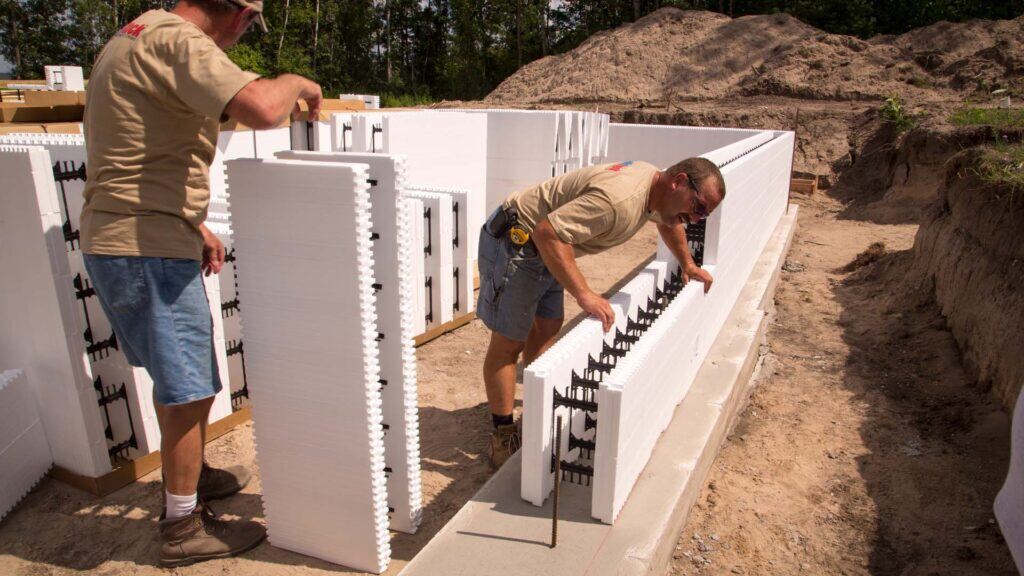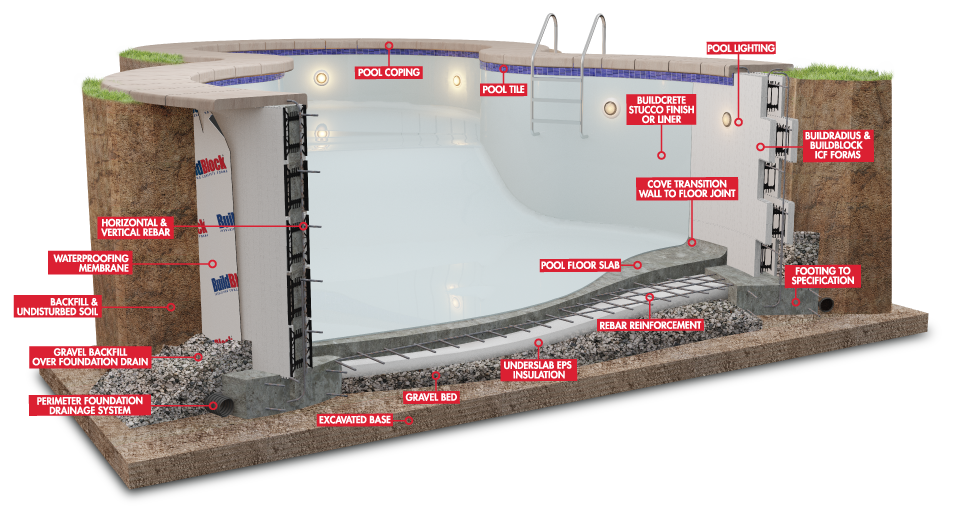Building with Insulated Concrete Forms Foundations and Basements





When constructing a foundation or basement, choosing the right building material is critical for durability, energy efficiency, and cost-effectiveness.
Insulated Concrete Forms (ICFs) are emerging as a preferred solution for foundations and basements, offering advantages over traditional methods like Concrete Masonry Units (CMUs), precast systems such as Superior Walls, and conventional cast-in-place concrete.
This article explores why ICFs are revolutionizing the way we build, focusing on the unparalleled benefits of BuildBlock ICFs.
What Are Insulated Concrete Forms?
ICFs are hollow foam blocks made from Expanded Polystyrene (EPS) that are stacked to create walls. The forms are filled with reinforced concrete, combining the strength of traditional construction with advanced thermal and acoustic insulation.
Advantages of ICF Foundations and Basements
- Thermal Performance
ICFs offer high R-values, significantly reducing heat loss compared to traditional materials like CMU or cast-in-place walls. This makes ICF foundations ideal for energy-efficient buildings, as basements often account for a large portion of heat loss in homes. - Moisture and Mold Resistance
Unlike traditional concrete or CMU walls, ICFs incorporate foam insulation that resists moisture infiltration and reduces the risk of mold growth, ensuring a healthier living environment. - Durability and Strength
The concrete core of ICF walls is reinforced with rebar, creating a structure capable of withstanding natural disasters like floods and earthquakes. - Ease of Installation
- Lightweight Blocks: BuildBlock ICFs weigh less than 9 pounds each, making them easier to handle and transport compared to heavy CMU blocks or precast panels.
- Reversible Design: BuildBlock forms are fully reversible, saving time and minimizing errors during installation.
- Precise Measurements: Printed measurements on the blocks simplify cutting and alignment, enhancing accuracy during construction.
How BuildBlock ICFs Compare to Other Methods
ICFs vs. CMU (Concrete Masonry Units)
- Energy Efficiency: CMU blocks lack the integrated insulation of ICFs, requiring additional steps to insulate. ICF walls, on the other hand, offer superior thermal performance right out of the box.
- Labor Costs: Stacking CMU blocks is labor-intensive and often requires mortar between layers. In contrast, BuildBlock ICFs snap together quickly without mortar or adhesive.
- Strength: ICF walls have a monolithic concrete core, offering greater structural integrity than CMUs, which are hollow and rely on grouting for additional strength.
ICFs vs. Precast Products like Superior Walls
- Customization: ICFs allow on-site flexibility to create custom shapes and sizes, whereas precast systems are limited by factory molds.
- Thermal Performance: Precast panels require additional insulation, while BuildBlock ICFs include integrated EPS foam, saving time and costs.
- Transport and Handling: Precast panels are heavy and require cranes for installation. BuildBlock ICFs are lightweight and can be installed without specialized equipment.
ICFs vs. Cast-in-Place Concrete
- Efficiency: Cast-in-place concrete requires temporary forms that must be assembled, disassembled, and disposed of after use. BuildBlock ICFs eliminate this step as they serve as both the form and insulation.
- Labor Savings: The interlocking design of ICFs reduces construction time compared to the meticulous setup required for traditional cast-in-place forms.
- Insulation: Traditional cast-in-place systems require external insulation, whereas ICFs integrate insulation directly into the wall structure.
The Installation Process for ICF Foundations and Basements
- Preparation
- Level and compact the foundation site.
- Set up footing forms and pour the concrete footings to create a stable base.
- Stacking the Forms
- Begin by stacking the first course of ICF blocks directly onto the footings. BuildBlock’s interlocking system ensures blocks snap together securely, with no additional adhesive required.
- Use BuildBlock’s measurements printed directly on the blocks to make precise cuts as needed.
- Installing Rebar
- Place horizontal and vertical rebar into the built-in channels within the ICF blocks. BuildBlock’s design holds rebar securely in place, eliminating the need for tying steel.
- Bracing the Walls
- Use BuildBrace systems to ensure walls are straight and plumb during the concrete pour. This is critical for achieving a professional finish and ensuring structural integrity.
- Pouring Concrete
- Pour concrete in lifts to avoid pressure buildup. Use a pencil vibrator to consolidate the concrete and remove air pockets.
- Backfilling
- Once the concrete has cured, waterproof the ICF walls and carefully backfill around the foundation.
Why Choose BuildBlock for Your ICF Project?
BuildBlock ICFs stand out for their unique features:
- Ease of Use: Lightweight, reversible, and easy to cut, BuildBlock forms are designed for efficiency.
- Durability: High-density plastic webs and integrated rebar channels enhance strength.
- Energy Efficiency: Integrated EPS foam ensures superior thermal performance.
- Versatility: BuildBlock ICFs can be used for foundations, basements, and above-grade walls alike, accommodating a variety of construction needs.
Applications for ICF Foundations and Basements
Residential Basements
ICFs provide a dry, comfortable, and energy-efficient living space, making them ideal for finished basements or below-grade safe rooms.
Commercial Projects
From parking garages to storage facilities, ICF foundations offer unparalleled strength and durability for commercial applications.
Choosing insulated concrete forms for foundations and basements offers unmatched benefits in terms of energy efficiency, durability, and ease of installation. BuildBlock ICFs, with their innovative design and user-friendly features, outshine traditional construction methods like CMU, precast panels, and cast-in-place systems.
Ready to build smarter? Contact HALCO BuildBlock today for expert advice and premium ICF products. Let’s bring your foundation and basement projects to life with the power of BuildBlock!


